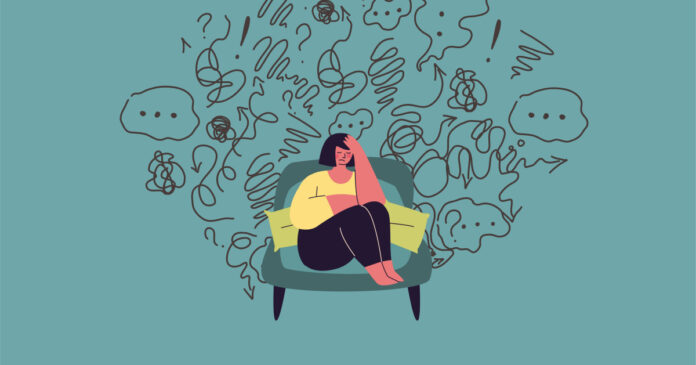Roton Malo:
Usually, we think of our physical wellbeing and healthiness and believe this is the indicator of being well literally while mental health and wellbeing remain on the dark side of our life which mainly influences our activities in the physical world.
There are numerous proverbs on the wellbeing of the mind in every country to say but very few of them are addressed in reality until the visible deterioration of a man/woman.
According to a survey conducted in 2019 by the National Institute of Mental Health and Hospital in Bangladesh, 16.8 % of people of 18-99 years ages suffer from mental problems while 13.6 % of children from 7-17 years go through some mental issues.
The most alarming thing is that 92.3 % of adults and 94.5 % of children who suffer from mental issues don’t take any treatment in Bangladesh.
The percentage of being untreated for mental problems is a big concern and that may be reasons for many things in society- frequent crimes, rape, violence, drugs, addiction, divorce, torture, brutality, inhumanity, cheating, family issues, and so on.
According to psychiatrists, proper counseling can resolve the mental issues in society but most people consider and practice counseling as advising, correcting, scolding, punishing, spying, and other things which are the wrong process towards mental wellbeing.
Associate Prof Dr Mekhala Sarkar, National Institute of Mental Health and Hospital, said “Counselling is a joint attempt/efforts by counsellor and the mentally ill person to find ways out of the problems.”
Counselling is not to fix or determine the ways out for the persons suffering from mental issues by the counsellor, but letting the person to cope with the situation and find ways out for him/herself from the ongoing crises, said Dr Sarkar at a three-day-long training on mental health and wellbeing for persons affected by leprosy at The Leprosy Mission International-Bangladesh (TLMI-B) office in Dhaka.
In the process of unaware or unconscious counselling, generally, we show our sympathy to our beloved person when they go through mental issues, but this process of showing sympathy is totally rejected in the scientific counselling process of resolving mental issues.
The counsellor must be empathetic to the person suffering from mental problem rather being sympathetic. So what are the basic differences between empathy and sympathy?
The elementary difference between empathy and sympathy is distinct that sympathy shows some personal understanding of other feelings while empathy is an expression of a same feelings of others are going through.
In our society, we are very much practiced in showing sympathy and it is positively recognized. Although showing sympathy is positive thing but actually it doesn’t bring any mental relieve to the person going through mental issues.
Besides, empathy never judges the person, the empathetic person only listens while the sympathetic person gives a lot of unasked advice. Empathy is experiencing other’s feeling while sympathy is to understand other’s position from own’s perspective.
An empathetic person always acknowledges the feelings of others and feel it by him/herself while a sympathetic person simply suppresses his feelings and other’s emotions as well.
Sometimes we may not find someone empathetic people around us but we may follow some tips to come out of our mental stress and go a normal life.
Mental Health of Persons Affected by Leprosy in Bangladesh
Over 85% people with leprosy-related disabilities in Bangladesh go through mental problems besides many more disease-related complications.
A study titled ‘The Quality of Life (QOL) and Mental Health Status (MHS) of People Affected by Leprosy and People with Leprosy Disability in Bangladesh’ brought the tragic scenario to the front.
The research supported by The Leprosy Mission International, Bangladesh, (TLMI-B) was conducted under supervision of INTERACTION Chief Executive Serajud Dahar Khan.
Actions need to be taken in 22 priority countries including Bangladesh as people affected by leprosy continue to suffer discrimination and lack of access to medical care, says the World Health Organization (WHO).
Leprosy itself is a highly stigmatised and disgraceful term in society while disability from the disease is the other concern that victimises the patient drastically, said the study.
Study findings showed that over mental health screening, 69% of the people affected by leprosy go through psychological difficulties. It is observed that 85% of the leprosy disabled people and 65% of the general leprosy patients were in poor psychological condition.
Mr Jjiptha Boiragee, Project Support Coordinator, TLMI-B, said mental health support for persons affected by leprosy is a very urgent need during the ongoing COVID-19 pandemic.
Prioritizing the counselling for persons affected by leprosy, Mr Boiragee, said the physicians, development workers, and other GO-NGO officials who directly deal with leprosy patients should learn some basic skills of providing mental aid and counselling to persons suffering from leprosy and leprosy-related disabilities.
Mental Health America has recently published some 31 tips to boost mental health. Just read it and you can think of the tips if you can apply it to overcome your own mental issues. The decision is yours…
1. Track gratitude and achievement every day. Include 3 things you were grateful for and 3 things you were able to accomplish each day.
2. Start your day with a cup of coffee. Coffee consumption is linked to lower rates of depression. If you can’t drink coffee because of the caffeine, try another good-for-you drink like green tea.
3. Set up a getaway. It could be camping with friends or a trip to the tropics. The act of planning a vacation and having something to look forward to can boost your overall happiness for up to 8 weeks!
4. Work your strengths. Do something you’re good at to build self-confidence, then tackle a tougher task.
5. Keep it cool for a good night’s sleep. The optimal temperature for sleep is between 60 and 67 degrees Fahrenheit or 16 to 19 degree celsius.
6. “You don’t have to see the whole staircase, just take the first step.” – Martin Luther King, Jr. Think of something in your life you want to improve, and figure out what you can do to take a step in the right direction.
7. Experiment with a new recipe, write a poem, paint or try a Pinterest project. Creative expression and overall well-being are linked.
8. Show some love to someone in your life. Close, quality, relationships are key for a happy, healthy life.
9. Boost brainpower by treating yourself to a couple pieces of dark chocolate every few days. The flavanoids, caffeine, and theobromine in chocolate are thought to work together to improve alertness and mental skills.
10. “There is no greater agony than bearing an untold story inside of you.”-Maya Angelou. If you have personal experience with mental illness or recovery, share on Twitter, Instagram and Tumblr with #mentalillnessfeelslike.
11. Sometimes, we don’t need to add new activities to get more pleasure. We just need to soak up the joy in the ones we’ve already got. Trying to be optimistic doesn’t mean ignoring the uglier sides of life. It just means focusing on the positive as much as possible.
12. Feeling anxious? Take a trip down memory lane and do some coloring for about 20 minutes to help you clear your mind. Pick a design that’s geometric and a little complicated for the best effect. Check out hundreds of free printable coloring pages here.
13. Take time to laugh. Hang out with a funny friend, watch a comedy or check out cute videos online. Laughter helps reduce anxiety.
14. Go off the grid. Leave your smartphone at home for a day and disconnect from constant emails, alerts, and other interruptions. Spend time doing something fun with someone face-to-face.
15. Dance around while you do your housework. Not only will you get chores done, but dancing reduces levels of cortisol (the stress hormone), and increases endorphins (the body’s “feel-good” chemicals).
16. Go ahead and yawn. Studies suggest that yawning helps cool the brain and improves alertness and mental efficiency.
17. Relax in a warm bath once a week. Try adding Epsom salts to soothe aches and pains and help boost magnesium levels, which can be depleted by stress.
18. Has something been bothering you? Let it all out…on paper. Writing about upsetting experiences can reduce symptoms of depression.
19. Spend some time with a furry friend. Time with animals lowers the stress hormone – cortisol, and boosts oxytocin – which stimulates feelings of happiness. If you don’t have a pet, hang out with a friend who does or volunteer at a shelter.
20. “What lies before us and what lies behind us are small matters compared to what lies within us. And when you bring what is within out into the world, miracles happen.” – Henry David Thoreau. Practice mindfulness by staying “in the present.”
21. Be a tourist in your own town. Often times people only explore attractions on trips, but you may be surprised what cool things are in your own backyard.
22. Try prepping your lunches or picking out your clothes for the work week. You’ll save some time in the mornings and have a sense of control about the week ahead.
23. Work some omega-3 fatty acids into your diet–they are linked to decreased rates of depression and schizophrenia among their many benefits. Fish oil supplements work, but eating your omega-3s in foods like wild salmon, flaxseeds or walnuts also helps build healthy gut bacteria.
24. Practice forgiveness – even if it’s just forgiving that person who cut you off during your commute. People who forgive have better mental health and report being more satisfied with their lives.
25. “What appear to be calamities are often the sources of fortune.”– Disraeli. Try to find the silver lining in something kind of cruddy that happened recently.
26. Feeling stressed? Smile. It may not be the easiest thing to do, but smiling can help to lower your heart rate and calm you down.
27. Send a thank you note – not for a material item, but to let someone know why you appreciate them. Written expressions of gratitude are linked to increased happiness.
28. Do something with friends and family – have a cookout, go to a park, or play a game. People are 12 times more likely to feel happy on days that they spend 6-7 hours with friends and family.
29. Take 30 minutes to go for a walk in nature – it could be a stroll through a park, or a hike in the woods. Research shows that being in nature can increase energy levels, reduce depression and boost well-being.
30. Do your best to enjoy 15 minutes of sunshine, and apply sunscreen. Sunlight synthesizes Vitamin D, which experts believe is a mood elevator.
31. “Anyone who has never made a mistake has never tried anything new.” -Albert Einstein. Try something outside of your comfort zone to make room for adventure and excitement in your life.
The writer is a freelance journalist and a development worker. You can reach him by emailing [email protected]
































